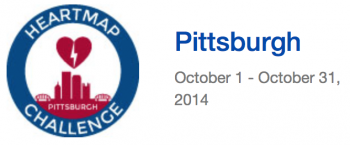
 PITTSBURGH, PA--The University of Pittsburgh Department of Emergency Medicine is hosting HeartMap Pittsburgh Challenge, a scavenger hunt to find automatic external defibrillators (AEDs), which are electronic, briefcase-sized devices that can be used by bystanders to help someone in cardiac arrest. The hunt, held in collaboration with the University of Washington-Harborview Center for Prehospital Emergency Care, is part of a national effort to create a registry of locations of these lifesaving devices.
PITTSBURGH, PA--The University of Pittsburgh Department of Emergency Medicine is hosting HeartMap Pittsburgh Challenge, a scavenger hunt to find automatic external defibrillators (AEDs), which are electronic, briefcase-sized devices that can be used by bystanders to help someone in cardiac arrest. The hunt, held in collaboration with the University of Washington-Harborview Center for Prehospital Emergency Care, is part of a national effort to create a registry of locations of these lifesaving devices.
Each year, emergency medical services treat about 383,000 victims of sudden cardiac arrest before they reach the hospital. Fewer than 12 percent of those victims survive, according to the American Heart Association. A victim’s chance of survival decreases by 7 percent to 10 percent for every minute that passes without defibrillation.
More than 1.2 million AEDs are now in public places in the United States, and about 180,000 more are installed each year. However, there is no formal method of tracking each location, and bystanders cannot always find the nearest AED during a medical emergency.
“This is a great way to raise awareness of the importance of AEDs for sudden cardiac arrest and to generate a comprehensive list of locations in Pittsburgh and the rest of the country,” said David Salcido, Ph.D., University of Pittsburgh School of Medicine research instructor and local project leader.
Participants in the scavenger hunt throughout the month of October will assist Pitt researchers by reporting the location of AEDs in community settings throughout the city of Pittsburgh.
In the future, the Allegheny County Department of Emergency Services 9-1-1 communications center dispatchers will be able to use contest results to tell 9-1-1 callers the location of the nearest AED.
“The location information in the registry will be verified and updated periodically so that the public can receive accurate information about where these devices are at the time of cardiac arrest,” says Graham Nichol, M.D., director, University of Washington-Harborview Center for Prehospital Emergency Care.
Registration for the challenge for individuals and teams is open. Prizes for locating AEDs will be awarded by the University of Washington and other sponsors, and range from $50 to $5,000. For more information on the HeartMap Pittsburgh Challenge, including registration, follow HeartMap Pittsburgh on twitter (@cprnation, #PittsburghHeartMap) or at cprnation.org.
For information, click here.
To support Sudden Cardiac Arrest Foundation efforts, click here and join the You Can Save a Life team.
The HeartMap Pittsburgh Challenge is funded by the U.S. Food and Drug Administration, Zoll Medical Inc., Philips Healthcare Inc., Physio-Control Inc., HeartSine Technologies Inc., and Cardiac Science Inc. The collaborating sponsors include the University of Pennsylvania, University of Washington and the American Heart Association.
SOURCE: University of Pittsburgh
